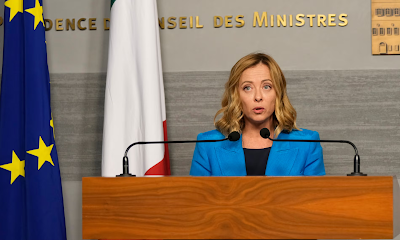In a significant setback for the Italian government’s migration policy, an Italian court has ruled that the last 12 asylum seekers being held at a new processing center in Albania must be transferred back to Italy. This decision undermines a controversial agreement between Italy's far-right government and Albania aimed at reducing migrant arrivals.
The ruling raises serious questions about the legality and practicality of the European Union’s plans to establish migrant processing and detention centers outside its borders as part of a stricter approach to migration. The court's decision comes just days after four of the first group of 16 asylum seekers, who were sent to the facility in Albania from Italy, were returned to Italy on Thursday.
Giorgia Meloni's party, Brothers of Italy, reacted strongly to the ruling, criticizing what they termed “politicised magistrates” who allegedly want to undermine Italy’s borders. Interior Minister Matteo Piantedosi stated, “We will appeal all the way to the Court of Cassation. We will continue with what Italy is achieving in Albania, and it will become European law.”
The asylum seekers, who arrived at the Albanian port of Shëngjin on a military vessel, are believed to have been from “safe” countries, specifically Egypt and Bangladesh. Under the terms of the agreement, men intercepted at sea will be detained in Albania while their asylum claims are processed. However, the scheme does not include women, children, or vulnerable individuals, who will be sent to Italy. The first four men returned to Italy were reported to include two minors and two vulnerable individuals.
The Italian judges ruled that the remaining 12 asylum seekers were at risk of violence if sent back to their home countries, echoing a ruling made by the European Court of Justice on October 4. According to the ruling, only migrants from a list of 22 nations classified as “safe” can be sent to Albania, and the ECJ determined that a country outside the EU could not be declared safe unless its entire territory was deemed safe.
Judge Luciana Sangiovanni stated, “The rejection of the individuals’ detention in structures in Albania equates to Italian border or transit zones due to the impossibility of recognizing the states of origin of the detained individuals as ‘safe countries.’”
The Italian government’s initiative, expected to cost around €1 billion over five years, has already faced criticism. Opposition parties claim the plan is failing, highlighting the €250,000 spent to transport the 16 men to Albania on a military vessel. The Democratic Party has called for Meloni to apologize, while the Europe party is demanding Piantedosi's resignation.
A coalition of 160 NGOs has labeled the Italy-Albanian deal as “inhumane” and contrary to international human rights obligations. Michele LeVoy from the Platform for International Cooperation on Undocumented Migrants expressed concern over the growing support among EU member states for offshore migrant processing centers. “It’s a cruel system that breaches international and EU law and puts people at risk of being abused,” he said.
During a recent EU summit in Brussels, leaders discussed establishing “return hubs” outside the bloc, with Commission President Ursula von der Leyen indicating that discussions on how these centers might operate would continue. However, doubts remain regarding the legality and effectiveness of such offshore models.
While irregular immigration to the EU has significantly decreased since the 2015 migration crisis, the tough stance reflects the electoral successes of far-right, anti-immigration parties across Europe.





No comments:
Post a Comment